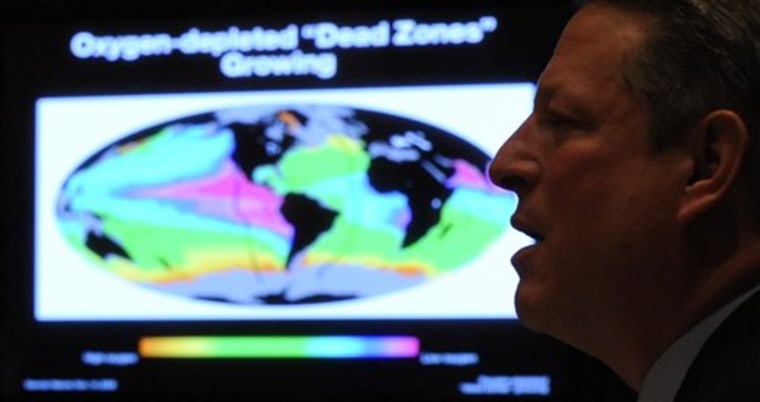Arguing that recent climate signals are cause for greater alarm, former Vice President Al Gore testified before the Senate Foreign Relations Committee Wednesday that lawmakers must "take decisive action this year" to curb carbon emissions.
Gore urged lawmakers not to be sidetracked by the current financial crisis, adding that a bill capping greenhouse gas emissions is needed this year if the United States is to play a leading role in negotiations for a new international climate treaty.
Gore was invited to testify before the committee by its chairman, Sen. John Kerry, D-Mass., who said he wanted to send the message that his panel would be "super-focused" on rejoining those international talks.
The Bush administration refused to work within the 1997 Kyoto climate protocol because large developing countries like China and India were not bound by the pact. Negotiations on a new agreement are scheduled for later this year in Copenhagen, Denmark.
'Common thread'
In his testimony, Gore urged Congress to pass President Barack Obama's economic stimulus plan, saying the proposed investments in clean energy and green jobs will help dig the country out of its economic rut.
Gore — co-recipient of the Nobel Peace Prize whose book on global warming became an Oscar-winning documentary — said the economic recession, the terrorism threat and the wars in Iraq and Afghanistan should not cause any delay.
Instead, he argued, lawmakers should see those challenges as tied to the same problem.
"It is becoming clearer that they are linked by a common thread — our dangerous over-reliance on carbon-based fuels," he said. "As long as we continue to send hundreds of billions of dollars for foreign oil — year after year — to the most dangerous and unstable regions of the world, our national security will continue to be at risk."
"As long as we continue to depend on dirty fossil fuels like coal and oil to meet our energy needs," Gore added, "we move closer and closer to several dangerous tipping points which scientists have repeatedly warned — again just yesterday — will threaten to make it impossible for us to avoid irretrievable destruction of the conditions that make human civilization possible on this planet."
His reference to Tuesday was a study sponsored by the federal government that predicted significant climate impacts over the next 1,000 years even if carbon emissions were capped soon.
Senators in both parties express optimism that a bill requiring mandatory reductions in greenhouse gases could pass before the Copenhagen meeting.
But Republicans, particularly Sen. Johnny Isakson and Sen. Bob Corker, pressed Gore on the role of nuclear power.
"If you accept every dire circumstance of climate change and you take a clean, reliable source of energy off the table. ... I don't think you can ever get to the solution you are seeking," Isakson said.
Gore said that he thought nuclear could play a small role, but would not be a "silver bullet." As for coal, he reiterated his position that no new coal-fired power plants should be built without the ability to capture and store carbon dioxide, and that the technology was too new to be proven.
Signs of momentum
Gore's congressional appearance is another sign that the Democratic-controlled Congress plans to act quickly on climate change.
It comes days after Obama signed orders that will boost the fuel efficiency of the nation's cars and trucks and could allow states to limit emissions of greenhouse gases from exhaust pipes.
Secretary of State Hillary Rodham Clinton also named a special climate envoy this week to lead U.S. negotiations on a new international treaty. She picked Todd Stern, a former White House assistant who was the chief U.S. negotiator at the Kyoto talks.
Kerry said he asked Gore to testify before the panel so "the message can go out loud and clear that the committee is going to be relentless and super-focused" on preparations for Copenhagen.
Gore is the perfect messenger, Kerry said.
Gore's message to lawmakers included this warning: "As long as we continue to allow our economy to remain shackled to the OPEC roller-coaster of rising and falling oil prices, our jobs and our way of life will remain at risk. Moreover, as the demand for oil worldwide grows rapidly over the longer term, even as the rate of new discoveries is falling, it is increasingly obvious that the roller coaster is headed for a crash. And we’re in the front car."
